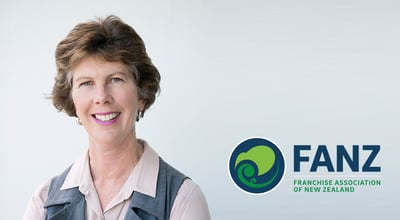Association Governance - A CEO's Perspective Part III
The following is Part 3 of a 4-part interview series with Robyn Pickerill, the CEO of the Franchise Association of New Zealand. Our conversation...
5 min read
AJ Sallis
:
Nov 10, 2023 12:37:41 PM

The following is Part 4 of a 4-part interview series with Robyn Pickerill, the CEO of the Franchise Association of New Zealand. Our conversation centred around her experience of Governance and board management. She also shares tools and advice that Association CEOs, especially new ones, will find useful.
You can read the other parts of the interview here:

What advice would you give to a new association CEO who is perhaps new to the not-for-profit space about working with their board?
First, meet with their chair and vice chair. Find out what their expectations are because they will be your go to people. I have a lot more contact with my chair and vice chair than I do with the rest of the board. I might not even have contact with other members of the board from meeting to meeting, but I will have a lot of contact with the chair and the vice chair.
Find out what their expectations are and how your board members like to communicate. Make sure everyone is aware of the resources available to them e.g. BoardPro.
I would suggest meeting all board members individually over a coffee. It is so good to learn about your people, who they are, what they do, what they are wanting to achieve from contributing to the board etc.
Following that, it would be really good to understand how the board meetings work, are you the person to take the minutes? Is there a minutes’ secretary provided? What are the expectations around that type of thing? Who prepares the agenda? Are there some guidelines for what should be on the agenda?
I have some other thoughts or ideas which are not so much to do with working with the board but just in general to help with your success, if you are a first time CEO in a Not for Profit, which I hope may be helpful.
When I arrived, there wasn’t a resource available to me that provided detailed information on the internal workings of the Association. It may be that there is no time for a thorough handover, or there may not even be one at all. If you are in the fortunate position of a thorough hand over, then soak up everything you can and write copious notes!
Therefore, a new person would not have to go hunting for information e.g., even something simply like your Incorporated Societies number. The manual should cover off things like:
A new CEO ideally should not have to go hunting for anything. I would recommend that all association leaders, CEO’s, should consider such a manual to ensure their association is in a position for good continuity. This is especially helpful if the staff change in a small organisation, the in-depth knowledge, can disappear quite quickly.
We've established processes and procedures and backup knowledge on all key areas of our business. So, my advice would be if there isn’t something like this available – work on creating one and in the meantime, you might ask another friendly association CEO to brief you on information you should be looking for. Of course, if you are already experienced in the association space this may not be an issue.
Staff – is another area to consider when new to your role as CEO of the Association.
Just as you get to know your board, get to know your staff and what they do, what their pressures are and what resources they need to perform their jobs, and what their ideas are to take the association ahead. Your staff are your gold, and you just need to tap into them! Appreciate them!
Members are also obviously another key as are all the other stakeholders, sponsors, partners etc.
Does it contain observations around, for example, the culture or the personality of your members?
No, it doesn’t, and I would not recommend writing down personal opinions. Stick to facts as this is a practical document, to be shared with those who need it.
How do you see association boards evolving over the next 5 to 10 years?
I’m not sure how they will evolve. Even looking back five years, it’s hard to tell what’s changed. Fundamentally the structures are the same, similar decisions need to be made, similar things need to be looked after and examined. We do lots of little things better and technology has had an impact, like using the BoardPro. Looking forward maybe AI or some sort of tool comes in and helps the actual meeting process, the taking of the minutes, or something like that.
There's always going to be legislation that requires us to do certain things at certain times. So, I think, it might be more the people in the makeup of your board that will change. There'll be younger people coming through who think slightly differently, will bring fresh ideas to how the organisation can operate and how they can make things happen.
But I don't think that governance itself will change a lot. It's kind of timeless and has served us well.
What impact did COVID have on your board and its resilience?
I think COVID had more of an effect on our members and the way they operated, and the streamlining of many of their systems. For us it was probably more of a frustration for our meetings as it's hard to have a four-hour meeting online, so you have shorter meetings. It was harder to get the desired level of interaction when meeting online.
We obviously had to change some key processes, for example having the AGM online and offering educational sessions online, but those were more management changes. The board still continued to function well.
Is there anything else that you'd like to add?
There are always different ways to do things and I think sharing and learning about how other associations do things is always really interesting.
I would like time to learn and share more with other CEOs, but we all get so busy doing all that we do, that like many others, I often do not find the time. Thanks to someone else sharing though that’s how I heard about BoardPro, so there's always something to be learned from others who run organisations. I do believe that being a member of AuSAE is really helpful, as there are a lot of resources there and they put on great conferences and meetings for associations.
One thing that it is important to appreciate, is that in a not for profit, and certainly in our association, people are voluntarily giving up their time. Everyone’s time is so compromised, and you have to constantly remember that you are working with marvellous people who are giving up valuable time to assist your association, when other people haven't been able to do that. Everyone is working with a common goal and if you appreciate this, and adapt to the people you are working with, I would be confident that your organisation will move ahead.
You can read the other parts of the interview here:

The following is Part 3 of a 4-part interview series with Robyn Pickerill, the CEO of the Franchise Association of New Zealand. Our conversation...

The following is Part 2 of a 4-part interview series with Robyn Pickerill, the CEO of the Franchise Association of New Zealand. Our conversation...

The following is Part 1 of a 4-part interview series with Robyn Pickerill, the CEO of the Franchise Association of New Zealand. Our conversation...